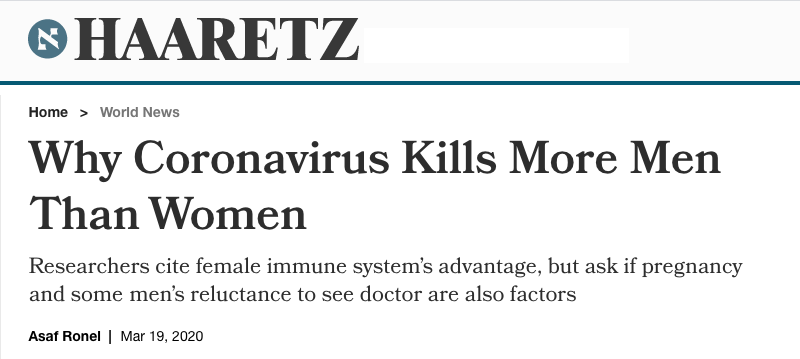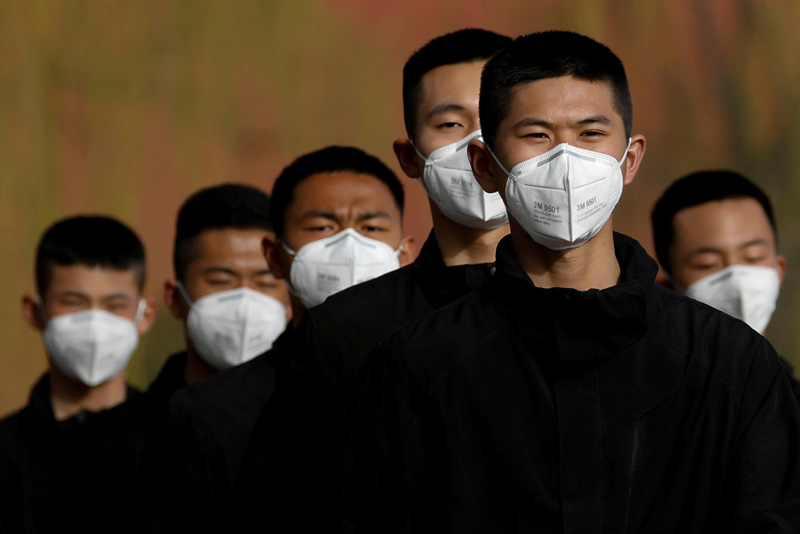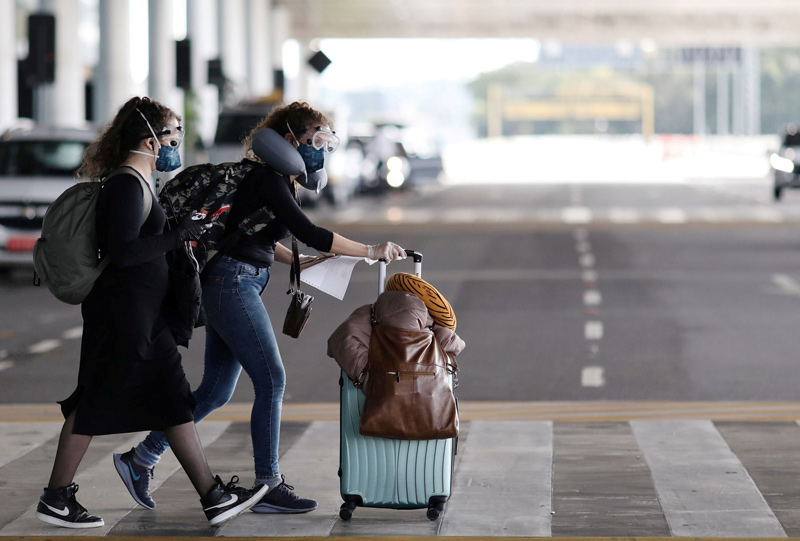

A key question about the coronavirus epidemic that experts are trying to solve involves the differences in the death rates among its victims.
So far, the rate of infection in the general population is not known; there are only estimates. But one notable statistic in the demographic data that have been collected so far is that although men and women get infected at equal rates, men have been dying from complications at a significantly higher rate than women. And the gender disparity exists in every age group.
For example, data from China show that among the tens of thousands of people infected there, 2.8 percent of men died from the virus compared with 1.7 percent of women. The median age of the fatal cases among women was also five years older than among men. Although research is being conducted around the world on SARS-CoV-2, the scientific name for the new coronavirus, there are still more questions than answers and scientists can only offer presumptions regarding the gender gap, which will require further research.
Prof. Ronit Sarid, a virologist at Bar-Ilan University in Ramat Gan, explained that such gender differences exist in the body’s response to various diseases caused by viruses, as a result of the different way that male and female immune systems respond, or as a result of hormonal changes that have been linked to how the virus acts.

Sarid mentioned that differences between the male and female immune systems are also responsible for the fact that women have more autoimmune disorders than men – due to the overreaction of the immune system. Among the 10 most common autoimmune disorders, women suffer more from nine of them, sometimes much more.
Cyrille Cohen, an immunology professor at Bar-Ilan, said that among the risk factors for death from the coronavirus are high blood pressure and heart disease – which are more prevalent among men than women.
Shani Gal-Oz, a doctoral student at Ben-Gurion University, who is researching gender differences in the immune system, and is also affiliated with the Israeli Society for Gender- and Sex-Conscious Medicine, said a lot of research has shown that in general, men have a greater tendency to get infectious diseases (caused by bacteria or virus) and to get more serious cases of them.
That is because women’s immune systems are more active, she said. It means that the immune system that they are born with to counteract foreign intrusions is more efficient than that of men, but also that women are more prone to the system overreacting, resulting in autoimmune diseases.
Research on mice conducted by Gal-Oz and her doctoral supervisor, Dr. Tal Shay, along with Christophe Benoist of Harvard University, has shown that important immune system cells called macrophagues, which are part of the immune system we are born with, respond differently to threats.
Among female mice, Gal-Oz said, “We have seen that a portion of the macrophage population is active without immune stimulation, a phenomenon that has not been observed in males.”
There are two possible directions that can be pursued in explaining this difference and others that have been found between the male and female immune systems: the genetic and the hormonal. And as with many other things in the human body, they are connected to one another.
The X chromosome has genes that relate to the immune system, Gal-Oz explained. Portions of the X chromosome are involved in regulation of gene expression of the immune system on other chromosomes. And men, she noted, have an X chromosome and a Y, while women have two copies of the X. As the female embryo develops, one of the copies of the female’s X is inactivated. But sometimes parts of the chromosome may escape the inactivation, meaning that some women have two copies of DNA related to the immune system.

A second avenue for explaining the gender disparity is that hormonal differences affect the functioning of the immune system. Gal-Oz noted that studies have linked the “female hormone” estrogen to protection from the first SARS virus, a cousin of the new coronavirus. Female mice who have had their estrogen levels reduced were shown to have lost their enhanced protection against the virus compared to their male counterparts.
What’s the connection between the two explanations? “The gene for encoding estrogen is also the one on the X chromosome,” Gal-Oz said.
Another biological factor that could explain the gender difference is the receptors present on the surface of healthy cells that the virus attacks. Research at a hospital in China – but that has not undergone peer review – found a significant difference in the concentration of these receptors on the lung cells of men and women.
Prof. Michal Linial, a computational biologist at Hebrew University, who is researching these receptors as part of an effort to stem the current epidemic, said the gene responsible for these receptors is also on the X chromosome. It is possible that having two copies of the gene requires women’s bodies to regulate the receptors more closely, she said, “but that’s an assumption that needs to be examined.”

Linial pointed out that the immune systems of men and women are also different because men don’t get pregnant.

“In pregnancy, the woman’s body has to avoid a negative response to the development inside of it of an entire organism, half of whose DNA is totally foreign. Various mechanisms have to activate to suppress the immune reaction of the body so that it doesn’t act against the embryo,” she explained. These changes can also affect that immune system at the end of pregnancy and in the woman’s life afterward.
This was a general hypothesis, Linial noted, and research is necessary to verify whether it could explain the disparity in the death rates among men and women, but she said it was a clear example of the differences in the immunity of males and females.
Beyond genetic and hormonal differences, Gal-Oz noted that behavioral differences might explain at least a portion of the disparity. For example, she said, men tend to be more likely to smoke. The statistical difference is particularly apparent in China, but it is also present to a lesser extent in Italy. Many studies have shown smoking to be a significant risk factor for complications from respiratory infections.
Another behavioral difference, she said, is seen in studies which have found that men are less likely to seek medical treatment, and that when they do, they tend to already be sicker and therefore more at risk of dying.
As of now, all of this is in the nature of conjecture because not enough time has passed for in-depth research into how the coronavirus acts on the human body. There is hope that additional research in the coming months will be able to dispel the uncertainty regarding this aspect of the disease that is currently stalking the world.